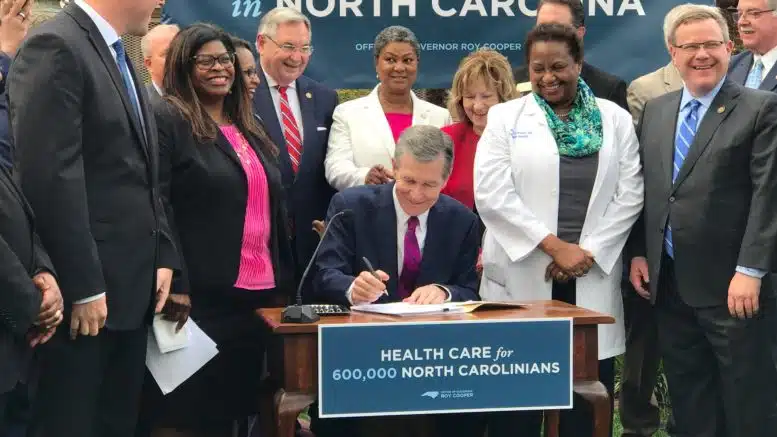By Rose Hoban
The sun was shining, the garden was blooming and the crowd at the governor’s mansion in Raleigh was large, animated and, at times, almost giddy.
Dozens of longtime Medicaid expansion advocates, health care providers, lobbyists, legislators and hospital leaders were gathered to witness Gov. Roy Cooper sign a bill that creates a way for hundreds of thousands of mostly low-income North Carolinians to finally get access to health insurance coverage.
House Bill 76 expands the state’s Medicaid program to sweep in an estimated 600,000 people who make too much to qualify for Medicaid, which usually covers low-income children, some of their parents, some people with disabilities and low-income seniors. These same people also make too little (less than $20,200/year for one person or $34,300 for a family of three) to qualify for health insurance subsidies on the exchange created by former President Barack Obama’s landmark Affordable Care Act.
Now that the bill is law, North Carolina becomes the 40th state to give many low-income workers who fell into what’s been called the “coverage gap” access to care.
Advocates have been pressing for such a law since the legislature rejected Medicaid expansion in 2013. For many of the people who’ve worked toward this week, the celebrations were bittersweet. They were tinged with the memories of people who didn’t survive long enough to see the bill get signed.
What ifs
Cassandra Brooks, who spoke at the event, choked up as she remembered two former employees. Brooks is the owner of Little Believers Academy, child care centers in Garner and Clayton.
“As I look back, … the reason I started this Medicaid expansion advocacy work was due to losing two childcare teachers — Miss Brenda Pernell and Miss Cathy Faulkner,” Brooks told the crowd who had gathered to celebrate. “They were excellent early childhood teachers who didn’t have health insurance and passed away due to preventable health conditions.”
After the event, she told NC Health News that both women had cardiovascular issues. Pernell eventually had a stroke that killed her.
“She said that she knew she had high blood pressure, and she could not afford to go to the doctor,” Brooks said. Pernell also couldn’t afford medication. “She was treating herself with apple cider vinegar to help lower blood pressure.”
Pernell’s son was in college when his mother died. “He had to become a grown man overnight,” Brooks said. “He stepped up and raised his younger siblings.”
Now the young man is a schoolteacher. Brooks said she invited him to attend the signing ceremony with her, but his schedule didn’t allow for it.
“He was just so thankful for this, that this is finally coming to pass,” Brooks said.
Brooks’ employees likely aren’t the only people for whom Medicaid expansion came too late. According to research from the National Bureau of Economic Research, between 2014 and 2017, at least 15,600 people in non-expansion states died prematurely due to issues that could have been preventable had they had access to an expanded Medicaid program. About 1,400 of those people were in North Carolina, the authors estimated.
They also noted that as time went on, and beneficiaries received more management of their chronic conditions, the mortality rate among the newly Medicaid-eligible in states that expanded appeared to decline.
“Estimates suggest that cardiovascular disease might account for approximately 38 percent of the overall reduction in internal mortality, with endocrine and metabolic diseases accounting for another 18 percent,” the authors wrote. One of the most prevalent endocrine disorders is diabetes, which affects more than a million North Carolinians, according to the American Diabetes Association.
Barriers to treatment
Steve Luking said he can’t be sure that some of his former patients died for lack of Medicaid expansion, but the retired family physician from Rockingham County suspects it was a contributing factor.
“I have hundreds of patients without insurance,” Luking said. “I’m watching them come down with delayed diagnosis of their cancers. I’m watching them have poorly managed diabetes and hypertension because they cannot afford their medications. I’m watching them develop advanced, untreated mental illness. I’m watching them develop disease, and I’m watching some of them die — and with full knowledge on my part that their lack of insurance is increasing their chances of premature death.”
Luking said he had been excited by the prospect of Medicaid expansion under the ACA. Then a 2012 Supreme Court case placed the decision into the hands of state legislatures, and North Carolina repeatedly declined the expansion through the past decade.

Eleanor Greene, an obstetrician/ gynecologist based in High Point, is relatively certain that several of her patients who fell into the coverage gap died because they did not have insurance.
One, a 48-year-old woman, came in after months of vaginal bleeding. Although she was working, her job didn’t provide insurance. The woman waited to seek care from Greene only after she found coverage she could afford.
“When I put the speculum in to look at her cervix to get a Pap smear, half of her cervix was gone. It was eroded by a cancer, and it was bleeding and necrotic material on there,” Greene said, recalling the tears she shed in her office that day. “I knew it was cancer. I hadn’t seen a case of that advanced cervical cancer in many years.”
Greene’s patient was referred to a gynecological cancer specialist who was able to get her into a Medicaid program that covers women with breast and cervical cancers. Though the patient was not responsible for the full cost, the treatment added up to between $300.000 and $400.000.
“It does not make economic sense to have someone wait and then all of a sudden they can get all the treatment they need,” Greene said. “But by the time you get to that point, it’s too late.”
The woman died several years later, but she kept her job until the end.
“This has happened over and over and over,” Greene said. “The names we don’t know. The doctors we don’t know. But if this happened in my office during the past few years, you know it happened in thousands of other situations in North Carolina.”
“I was just so elated to see the Medicaid expansion bill be signed by the governor yesterday,” Greene added. “I know that thousands of citizens … will be able to have access to the health care that they need and deserve. They’re not deadbeats. I mean, these are people who, just like the governor said, they’re working in hotels or working in the McDonald’s.”
Greene and Luking were some of the many physicians who have advocated for expansion over the past decade. Another was Charles van der Horst, a researcher at the University of North Carolina at Chapel Hill who became an outspoken expansion proponent. Before his death in 2019, van der Horst regularly attended rallies at the legislature to urge lawmakers to expand Medicaid. His widow, Laura Svetkey, said she was thinking of him this week.
“It’s a wonderful thing. He would have recognized it’s a wonderful thing, you know, it was a little heartbreaking for me that he wasn’t here to see it,” said Svetkey, a physician at the Duke University School of Medicine. “I think about those lives lost over 10 years for … for what feels like no reason whatsoever. I think he would have just really been mad and sad about that.”

“Let’s celebrate that we’re not delaying it any further, missing out on this opportunity any further. But still, the delay had a huge impact,” Svetkey added.
Although the bill has been signed into law, it does not go into effect until the state budget is adopted. The new fiscal year starts on July 1. It is unclear how quickly lawmakers will develop their budget for the next two years and whether the spending plan is something the governor will sign into law.
Budgets in recent years often have included controversial policies that divide lawmakers and the governor along partisan lines.
Sign up for our Newsletter
WIth that in mind, those celebrating will remain in limbo for several more months — after the many years it took to bring lawmakers on board for Medicaid expansion.








